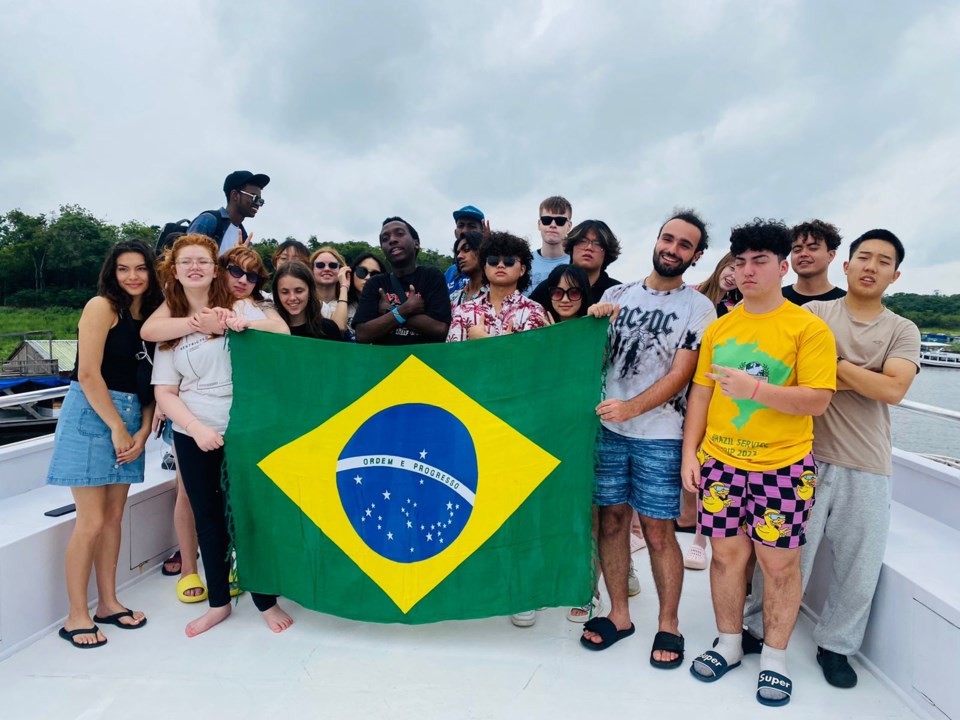The 30th annual World Citizenship Tour was an especially inspiring class trip for Nancy Campbell Academy students.
“I’ve been on two other trips before,” said Amin Rowhani. "But every single time you go, it's a completely different experience … it just becomes a different dynamic.”
Every year Grade 11 students at the school travel to a foreign country as a way for youth to address world issues that face their peers: drugs, violence, and teen pregnancy, for example.
This year, students prepared a step dance, using stomping, footwork, and movement to express a message that does not need translation to hundreds of students in Manaus, Brazil.
“We didn't make the dance from scratch, because it was already made for us,” said Ivy Handler, one of the students and the appointed emcee for the shows. “But every year seems to have their own modifications and niches within the dance. So every time it's performed by a different class, it looks slightly different.”
Geoffrey Gatete, a Grade 12 student, had his work cut out for him. He joined the travelling group but wasn’t planning on dancing.
With only a couple of hours to learn, Gatete “rose to the occasion,” as Vice Principal Sonja Rowhani said, and performed at each of the assemblies, often dancing with his classmates for hours in the hot, Brazilian climate.
“After three to four performances,” Gatete explained. “We see people come at us saying how happy they are … you don't know how it's going to impact someone and it just happens to impact so many people that you wouldn't even imagine.”
“It speaks to the power of the arts,” Rowhani continued. “There was a language barrier and so we couldn't really communicate as free as we wanted to. But we were able to touch hearts with the dances.”
Their work got the attention of local media, who wrote about the touring group, and local politicians. On a small rooftop balcony, students were able to perform for the mayor of Manaus. Even as aids were telling him of other appointments to go to, the students said that he stayed and watched the performance attentively.
Student Miriam Hill remarked that it was inspiring to see youth from far off places deal with the same social justice issues, racism, poverty, and drug abuse prevalent in Canada.
As she wrote in the school newsletter, “The dances bring problems like drug addiction, domestic abuse, and gang violence to the forefront of people’s minds; they are seeds that germinate in societal transformation.”
Hill also pointed out that the students from the 10 schools they visited were some of the most engaged audience members she has seen.
Aside from the outreach work the students did, they also got to see some incredible sights.
For Hill, one highlight was taking a boat to see where the Solimões River and Rio Negro meet. The Solimões, an upper part of the Amazon River, has a sandy colour while the Rio Negro is known for its black colour.
“When they meet they mix really slowly, so it swirls around and it looks so cool. Kind of looks like milk and coffee,” she said.
For any students thinking about joining the World Citizenship Tour in the future, the students couldn’t recommend it enough.
“It is 100 per cent worth it,” Handler said. “Every person goes through a change if they really get involved in the community here. And they become a better person, because they're influenced by good people … It's really fun and interesting, and it's good for you.”
Handler said that not everyone has the opportunity to travel across the world, but everyone should take the opportunity for service in their own backyard.
“Going on a trip and really seeing the impact of service can really open your eyes to more that you can do - even in your own community,” Handler said.



